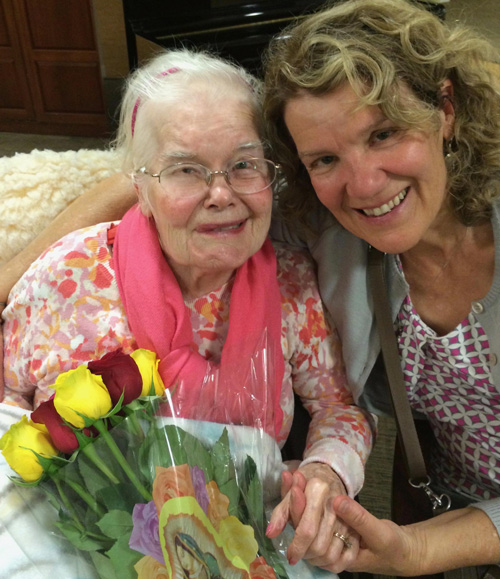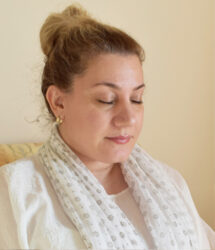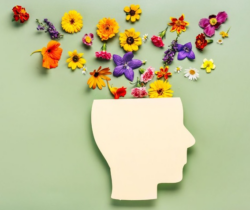New Hope for Alzheimer’s Prevention: TM, the Brain, and Dr. Dale Bredesen’s Remarkable Discovery

Probably the most challenging moment of my life took place in January 2009, when both of my parents were diagnosed with dementia of the Alzheimer’s kind on the same day. My sister and I had been aware of our mother’s short-term memory loss, and knew that our maternal grandmother and aunt had suffered from Alzheimer’s. But signs of my father’s decline had cropped up only months earlier, and we had attributed that to an infection. In other words, we were in denial, having completely forgotten that his mother also suffered from dementia.
In the difficult months following their dual diagnosis, I scoured my brain for what could have caused this catastrophe to happen. Our parents had been healthy and health-conscious all their lives. Starting in the 1960s, they exercised regularly and my mom grew garden vegetables, made fresh home-cooked meals and bought health-conscious items like whole wheat bread. They never smoked and rarely drank alcohol.
Was genetics the only cause, or could it be the well water? (We had that tested.) Was it exposure to the weed-killers that my dad used on the lawn and property? (Possible.) Was it the fact that years earlier they had stopped eating saturated fats in an attempt to avoid heart disease and “hardening of the arteries” (the term their parents had used to describe Alzheimer’s)—but had inadvertently starved their brains of necessary oils?
As their symptoms progressed, I gave up trying to find a cure, and with my sister, we devoted ourselves to making their last years as comfortable and full of love as possible. Our parents are no longer with us, but my sister and I share the memories of many beautiful moments and enjoy the strong bonds that formed during our most challenging journey together.
Yet despite the fact that I was able to make peace with their plight, not a day goes by that I don’t wonder what I can do to avoid this dread disease for myself and my siblings. One thought has played in my mind over and over—could my 40-year-practice of the Transcendental Meditation technique, which researchers have found enhances the functioning of the pre-frontal cortex, improves memory, and reduces stress—help me overcome the genetics that place me at high risk of inheriting the disease? And could it help the rest of my family if they became regular practitioners too?
Dale Bredesen, MD, an internationally renowned Alzheimer’s researcher, UCLA professor of neurology and author of the New York Times best-selling book, The End of Alzheimer’s: The First Program to Prevent and Reverse Cognitive Decline has answered that question with an encouraging “yes.” In an exciting new collaboration, Dr. Bredesen is recommending the Transcendental Meditation technique as an integral part of a treatment protocol that is not only having surprising results in reversing the symptoms of Alzheimer’s, but is turning our current understanding of this dread disease on its head.
A Revolutionary Discovery that Gives New Hope to Women
Alzheimer’s is a disease that disproportionately affects women. Two-thirds of sufferers and 63 percent of caregivers for people who have this disease are women. Here’s a surprising fact: women are more than twice as likely to develop Alzheimer’s in their lifetime than breast cancer. And as Dr. Bredesen writes in his book, unlike heart disease and cancer, there is currently no medication that cures or even slows down the progression of Alzheimer’s.
Dr. Bredesen feels that this is mainly due to barking up the wrong tree. He and his team made three new discoveries, supported by decades of research, that shed new light on this previously untreatable disease.
- Amyloid plaques and tau tangles are not the causes of Alzheimer’s.
Unlike other researchers, Dr. Bredesen and his team have concluded that the tau protein tangles and amyloid plaques found in the brains of Alzheimer’s patients are not the cause of the disease. Rather, they are the result of various types of assaults on the brain—in other words, an attempt to protect the brain. Therefore, Dr. Bredesen and his team conclude, the cure for Alzheimer’s lies in preventing the assaults to the brain. - There are three types of Alzheimer’s.
Dr. Bredesen and his team went about identifying 36 factors that assault the brain and cause it to take up this protective mode, triggering the amyloid plaques and the symptoms of Alzheimer’s. They found that these factors fall into three different categories:- Inflammation (from infection, diet or other causes)
- Decline and shortage of supportive nutrients, hormones, and other brain-supporting molecules
- Toxic substances such as metals, chemicals or biotoxins (poisons produced by microbes such as molds)
- The treatment is not a one-size-fits all pill, but an individualized lifestyle, supplementation and dietary regimen.
As the first step to prevent Alzheimer’s, Dr. Bredesen recommends a cognoscopy, a series of tests that can be arranged through your own doctor to determine which type of Alzheimer’s you are prone to and which factors have put you at risk. Dr. Bredesen has developed the Bredesen Protocol, which aims to repair the damage to the brain in an individualized program custom-made for you.
So far, the findings have been very encouraging. Dr. Bredesen’s research published in the peer-reviewed journal Aging reports that in an initial series of 19 patients with cognitive decline who followed his protocol, all but two experienced significant improvement in cognitive function. For most of these patients, cognitive improvements began within three to six months of starting the protocol—some in as little as four days. And many have been able to sustain their gains in cognition for years, as long as they adhere to the Bredesen Protocol. Dr. Bredesen is now tracking over 1,000 patients who are enrolled in and following the protocol.
The Case of Patient Zero
Dr. Bredesen and his colleagues first noticed the potential significance of TM in helping reverse the symptoms of Alzheimer’s five years ago in the case of Kristin, whom he calls “Patient Zero” in his book, because she was the first person to experience a dramatic and lasting reversal of early onset Alzheimer’s.
At 65, Kristin noticed a precipitous decline in cognition. She was making frequent errors in her high-powered job, getting lost on her oft-traveled drive home, and forgetting information that she had just read moments before. She was unable to recall the names of family members, pets, and long-time friends. In fact, she was so terrified that she had started on the same path as her late mother, who had recently died of early onset Alzheimer’s, that she decided to end her own life.
Then she found her way to Dr. Bredesen, who at the time was serving as director of the Buck Institute for Research on Aging in San Francisco, which he founded in 1998. After extensive testing, he prescribed an individualized protocol, which addressed 12 lifestyle, environmental and nutritional factors that were responsible for her decline (out of the 36 possible contributors that he and his team had identified). He also advised her to resume practice of the Transcendental Meditation technique, which she had learned previously but had not practiced for years.
Within three months, Kristin noticed a complete reversal. She could remember names again, could return to her high-power job fulltime, and could drive on the freeway without fear of getting lost. Five years later, Patient Zero is still following the Bredesen Protocol and doing very well, without symptoms. She describes her memory as better than ever, and has recently been offered a professorship at a leading university.
The TM Technique and the Brain
“There are a number of ways in which TM is actually a part of the overall approach to preventing and reversing cognitive decline,” Dr. Bredesen said, citing published studies on the TM technique showing improvements in neuroplasticity and global brain wave (EEG) coherence associated with improved cognitive performance, intelligence, and memory, as well as significant reductions in hypertension, stress and anxiety.
Nancy Lonsdorf, MD, has prescribed the TM technique in her practice for over 30 years, and recently became one of 450 medical practitioners who have trained with Dr. Bredesen to help prevent Alzheimer’s using his Bredesen Protocol.
Here Dr. Lonsdorf explains why she thinks the TM technique is helpful for brain health and memory.
“Transcendental Meditation holds great promise for supporting brain health and recovery from memory problems. For one thing, TM has been shown to significantly reduce cortisol, our stress hormone, which is directly toxic to the hippocampus, the brain’s memory center.
“Particularly as we get older, the memory center of our brain can become more and more affected by cortisol and the ability to turn off the stress response becomes less. Therefore we can enter into a vicious cycle of stress. Practicing the TM technique every day, twice a day, helps the body reduce cortisol and therefore reduce that damaging effect on that memory center.
“The flip side of too much stress hormone is a reduction in other hormones, because they are connected. Pregnenolone is the grandmother steroid hormone—and is shunted either down a stress pathway to make cortisol, or it goes down another pathway to be made into rejuvenating hormones, such as estrogen, progesterone, testosterone, and DHEA. So when we lower cortisol through the TM technique, not only does it help reduce direct toxic effects on the hippocampus and our memory, but it supports balanced production of other hormones that support brain health.
“Research points to numerous other ways the Transcendental Meditation technique can be helpful to our brain health: by improving focus, increasing broad comprehension, and supporting faster recovery from stress. Research also indicates that regular practice of the TM technique lowers blood pressure, which helps protect the blood flow to the brain, a critical factor for brain health.
“In addition, TM has been shown to have a favorable affect on blood sugar control, helping to reduce insulin resistance, a known risk factor for memory deterioration.
“I’ve witnessed sporadic cases that have impressed me with the power of TM for brain recovery. I have patients who have told me that learning TM was a turning point in their recovery from brain injury. One man who lost his hearing from a stroke suddenly recovered his hearing after taking an advanced course in TM. I have Parkinson’s patients who tell me that when they meditate with the advanced TM program for several hours a day that their condition is actually getting better over time. While these are isolated cases, they point to the healing effect of settling the mind, which results in the body being better able to regulate its metabolism, its hormones and the stress response—all critical factors in maintaining brain health.”
Dr. Bredesen is planning to conduct new research on the Bredesen Protocol, including the TM technique. Later, he wants to test single variables of the protocol, such as the TM technique.
“The strong suggestion, from everything that’s already been published, is that TM is something that is very promising for the brain and, specifically, for neural networks,” he says.
“No surprise, it turns out to be very important how you live,” Dr. Bredesen says. “What you do, what your nutritional status is, what your exposure is . . . . You want to lower stress. Again, this is where things like the TM technique come in to be so helpful.”
* Author’s note: quotes from Dr. Bredesen were borrowed with permission from the article “A New Advance in the Fight against Alzheimer’s” by Harbour Fraser Hodder in Enjoy TM News.
Additional Resources
• Listen to the “My Ageless Brain” free webinar by Dr. Nancy Lonsdorf on Alzheimer’s, TM and the Brain at https://iTeleseminar.com/103919412
• To Learn More about Dr. Nancy’s upcoming Six-Month My Ageless Brain Guided LIVE Webinar Intensive, go to www.MyAgelessBrain.com.
• Read more about the research on the Transcendental Meditation technique and the brain
About the Author
Linda Egenes writes about green and healthy living and is the author of six books, including The Ramayana: A New Retelling of Valmiki’s Ancient Epic—Complete and Comprehensive, co-authored with Kumuda Reddy, M.D.
More Posts by Linda
- Tired and Burned Out? Transcendental Meditation Can Help: An Interview with Dr. Nancy Lonsdorf, MD
- Worried About the Future? Six Ways to Calm Your Anxiety
- What Do You Carry in Your Self-Care Tool Kit?
- Five Strategies for Family Caregivers
- From the Streets to College in Four Months: The Communiversity of South Africa Empowers Underserved Youth in Cape Town





